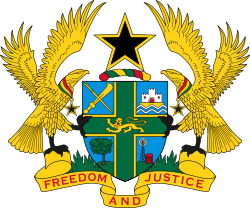Functions of the Ministry
The function of the ministry is to improve the distribution of electricity across the country, especially to communities and towns in rural Ghana. The ministry seeks to encourage the participation of the private sector in the development of energy infrastructure and secure future energy supply. [3] [1]
1.Regulation & Oversight
Oversees agencies such as:
- Volta River Authority (VRA)
- Ghana National Petroleum Corporation (GNPC)
- Electricity Company of Ghana (ECG).
3. Energy Planning :Coordinates planning and development of electricity, renewable energy, and petroleum projects.
4. Promoting Renewable Energy: Implements the Renewable Energy Act, 2011 (Act 832).
5. Oil & Gas Development: Ensures efficient exploration, production, and utilization of petroleum resources.
6. Energy Security: Expands access to reliable and affordable energy across Ghana.
This page is based on this
Wikipedia article Text is available under the
CC BY-SA 4.0 license; additional terms may apply.
Images, videos and audio are available under their respective licenses.


